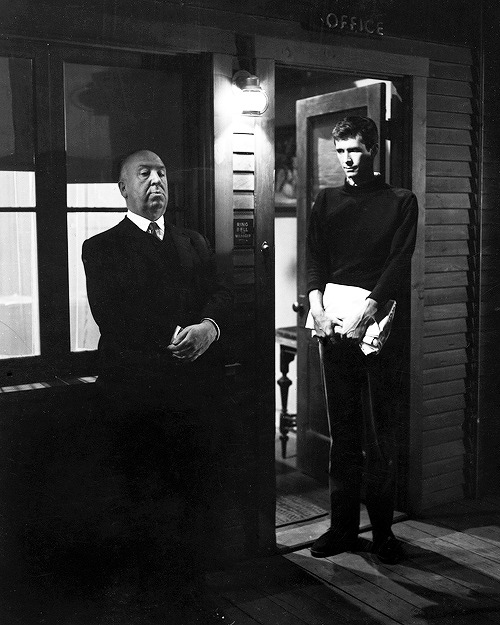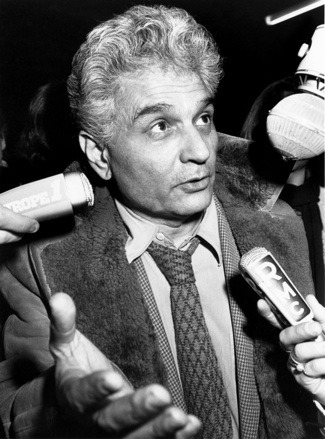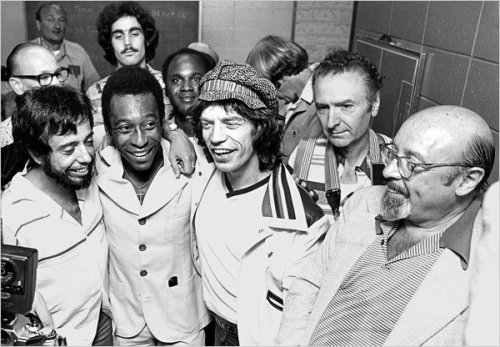
Lads: Alfred Hitchcock and Anthony Perkins on the set of “Psycho” (via IDrinkYourMilkshake)




International posters for Vincente Minnelli’s “The Bad and the Beautiful” (1952)
Reviews of this week's new releases in Portland-area theaters
New releases in Portland-area theaters not reviewed in this week's A&E
“Derrida” Documentary about Jacques Derrida, the French philosopher and founder, if that’s possible, of the post-structuralist concept of deconstruction. (5th Avenue Cinema, Friday through Sunday only)The skater known as Juvie Hall plans to visit nine countries for a film about her sport.
Roller derby competitors can put on a lot of miles on their skates without ever actually going anywhere. But one of the big wheels on a Portland roller derby team is getting ready to let her sport take her around the world.
In the coming year, Portlander Diana Federoff, who skates under the nom de track Juvie Hall, will travel to Mexico and eight other countries to compete in roller derby matches and make a documentary about the culture of the sport and its role in empowering women everywhere.
"Flat Track Around the World," as the film is known, is the brainchild of Federoff and a pair of Portland moviemakers, Cynthia Lopez and Alison Grayson. The intent of the film, as Federoff puts it, is to "ask how roller derby changes with the cultural and economic conditions of various countries and what drives people to roller derby in these different places."
The "Flat Track" crew will start production in Mexico City, Guadalajara and Tijuana in late June, then embark on a global journey in 2013: Australia, Singapore, Israel, Russia, France, Norway, Brazil and Peru. "There are 40 countries around the world with leagues," Federoff explains, and these destinations were chosen "to show the spectrum of how derby exists around the world."
Federoff, a writer and attorney with degrees from three universities, reckons that her experience with roller derby is typical. "I went as a spectator," she recalls, "and I said to myself, 'I have to do this.' I hadn't skated in maybe 20 years, since I was a kid, and I really hadn't ever played a team sport."
For the past three years, under her alter-ego Juvie Hall, Federoff has been a regular among the raucous, rolling throngs of skaters in Rose City Rollers matches. This season, she captained her team, Guns n Rollers, to the league semi-finals ("My legal skills have come in handy in arguing with the refs," she admits).
Federoff says that the camaraderie that she has enjoyed in the Portland roller derby community has been echoed in her experience of contacting skaters around the world to find subjects and settings for "Flat Track."
"We didn't have to do a lot of reaching out," she says. "In fact, they've been reaching out to us. We've had offers of places to stay and guides to various sights. The community is tight-knit and strong and inclusive."
Like so many independent film projects these days, "Flat Track" raised its initial budget of $9400 on the crowdfunding website Kickstarter. That sum -- more than they had originally sought -- will allow the filmmakers to use their three-city visit to Mexico as a kind of proof-of-concept trip, helping them shape the themes of the larger film and giving them footage that they can share with donors, sponsors and investors from whom they'll seek money for the longer voyage and the feature-length film.
To find out more about the project or follow blog updates from Federoff and her crew as they travel to Mexico and beyond, visit its web site.
The five films playing in Portland-area theaters that I'd soonest see again.
1) “The Deep Blue Sea” Terence Davies
is the finest director you’ve likely never heard of, probably because
his best films -- the quiet, devastating semi-autobiographical “Distant Voices, Still Lives” and “The Long Day Closes” -- were made more than two decades ago and he’s only had one film (“The House of Mirth,” an anomaly, really) get even a modest release since. Here, adapting Terence Rattigan’s 1952 play about a passionate woman (Rachel Weisz), her stodgy husband (Simon Russell Beale) and her unreliable lover (Tom Hiddleston),
his immense, inimitable gifts for image-making and, especially, turning
film into something like music are in full power. The effect is
sometimes funny, sometimes dramatic, sometimes absolutely ravishing.
Davies is a master, and this is his most accessible film. See it. Living Room Theaters
2) "Bernie” It’s a term of deep praise to note that writer-director Richard Linklater (deepbreath: “Slacker,” “Dazed and Confused,” “Before Sunrise,” “Before Sunset,” “Waking Life,” “School of Rock”)
is capable more than any contemporary American filmmaker of making
terrific movies about nearly nothing. Here, working with a
based-on-truth story, he gives us life in the small East Texas town of
Carthage, where a beneficent funeral director (Jack Black) and a mean, wealthy widow (Shirley MacLaine)
become unlikely chums and companions...under she mysteriously goes
missing. Linklater weaves the dramatized version of the story with dry
and deft interviews of actual Carthaginians (is that what they’re
called?) and even several musical numbers in a perfect frappe of a black
comedy. multiple locations
3) "The Triplets of Belleville" Before he made the utterly charming "The Illusionist," animator Sylvain Chomet made this utterly charming film about gangsters, music, bicycle racing, kidnapping, a sad-eyed boy, a fat dog, and a heroic grandmother. In some ways it's impossibly French, with the hot jazz and the Tour de France and the noirish touches. But the sheer imagination of the thing, the execution, the relentless eccentricity, and the infectious (and Oscar-nominated) music make it, I think, universally accessible. It was no surprise to see Chomet go on to adapt a Jacques Tati script in his subsequent film: this one, with all its quirks and its purely cinematic heart and soul, would have delighted the comic master. Northwest Film Center, Friday through Sunday only
4) "Moonrise Kingdom" Wes Anderson films are such a specific taste that I'm a bit hesitant to suggest that this might be his most approachable (but surely not crowd-pleasing) work. In the wake of the delightful "The Fantastic Mr. Fox," Anderson returns to live-action and his familiar tics and habits in a tale of young (as in 'pre-teen') lovers on the run. Newcomers Jared Gilman and Kara Hayward fill the lead roles delightfully, and Anderson's muses Bill Murray and Jason Schwartzman are joined ably by Edward Norton, Bruce Willis and Frances McDormand, among others. It's a light and breezy film with a very sweet heart and old-fashioned sturdiness. Even if you were left puzzled by the likes of "Rushmore" or "The Royal Tenenbaums" (still his best non-animated films, for me), this is likely to win you over. Fox Tower
The tale of 12-year-old sweethearts on the run is delightfully light and filled with the director's iconoclasm and quirks.
“Moonrise Kingdom” is Wes Anderson’s seventh feature film, and in some ways it’s typical of all of them, with tropes and tics and themes and actors familiar from the likes of “Bottle Rocket,” “Rushmore,” and “The Royal Tenenbaums” and the rest. (Indeed, so strong is Anderson’s artistic stamp that it even permeated 2009’s “The Fantastic Mr. Fox,” a stop-motion animated movie based on a Roald Dahl novel.)The director of "Alien" prequelizes his brilliant 1979 invention with mixed -- but always handsome -- results.
When he gave the world “Alien” in 1979, Ridley Scott was a young Turk with a eye that had won him honors in the worlds of advertising and television and one gorgeous but under-noted film, “The Duellists,” to his name.
The meaning of style: Jacques Derrida
An Oscar-nominated Canadian film is a small triumph of delicacy and restraint.
Discreet, delicate, and cautious, “Monsieur Lazhar” takes you by surprise -- and that goes for both the movie and the man.Catch 'em while you can!
Two films leaving town this week desrving of attention, especially considering the fact that they only just got here: "This Is Not a Film," a clever and painful documentary by Iranian director Jafar Panahi about life under house arrest and the threat of censorship; and "Polisse," a French drama about the professional and private lives of a squad of child protection officers in a rough part of Paris. Both worth a look.
Lemmy
The lives of actors are extended into a kind of immortality so long as their films still exist.
I had occasion recently to watch, for maybe the fourth time in my life, Cy Endfield's "Zulu," a terrific 1964 epic about the Anglo-Zulu war of 1879, particuarly the famed Battle of Rorke's Drift, when a contingent of perhaps 150 English soldiers managed, for 30 hours or so, to hold off perhaps 4000 Zulu warriors who had the previous day wiped out an English column of more than 1200 souls.
Lads: Sean Connery and Noel Coward


Toff: Michael Caine in “Zulu” (1964)
The documentary "Inside Job," about the causes of the global financial crisis, gives a man the idea to get some justice of his own.
Some people are inspired by works of art to change their lives. You hear of people reading books or seeing movies or visiting great architectural wonders and resolving to be better humans or casting off their everyday lives for something nobler and more selfless.



International posters for Cy Endfield’s “Zulu” (1964)



Sounds of a swingin’ weekend

What’s 50 years when you’re Amazin’? Johan Santana, 6/1/12
This week's new releases in Portland-area theaters.
New releases in Portland-area theaters not reviewed in this week's A&E.
“The Black Stallion” The gorgeous 1979 Carroll Ballard film about a boy and a horse. (Hollywood Theatre, Saturday only)NSFW: Timbers Army OG Chris Cooper celebrates/laments his fandom. He speaks for all fans everywhere, I think.

Hoops: Jane Fonda and Anthony Perkins do publicity for “Tall Story” (via weareallprostitutesandjunkies)
The five films playing in Portland-area theaters that I'd soonest see again.
1) “The Deep Blue Sea” Terence Davies is the finest director you’ve likely never heard of, probably because his best films -- the quiet, devastating semi-autobiographical “Distant Voices, Still Lives” and “The Long Day Closes” -- were made more than two decades ago and he’s only had one film (“The House of Mirth,” an anomaly, really) get even a modest release since. Here, adapting Terence Rattigan’s 1952 play about a passionate woman (Rachel Weisz), her stodgy husband (Simon Russell Beale) and her unreliable lover (Tom Hiddleston), his immense, inimitable gifts for image-making and, especially, turning film into something like music are in full power. The effect is sometimes funny, sometimes dramatic, sometimes absolutely ravishing. Davies is a master, and this is his most accessible film. See it. Living Room TheatersAn Iranian director subtly -- and bravely -- reveals his fate.
In December 2010, the Iranian director Jafar Panahi (“The White Balloon,” “Offside”) was charged with committing acts of propaganda against his country its security and sentenced to a six-year jail sentence and a 20-year ban from making movies.A truly evil queen and some delightful dwarves balance out a bland heroine.
Sometimes wondrous, sometimes overwrought, “Snow White and the Hunstman” is a big, noisy rendering of the fairy tale has been movie fodder since the silent era and particularly since Walt Disney’s 1937 animated masterpiece. There have been dozens of versions of the story; two already this year, in fact: the big screen comedy “Mirror, Mirror” and, with liberties, TV’s “Once Upon a Time.” But this is, in many ways, the largest in scale.The personal and professional lives of a child protection squad make for a volatile, uneven drama.
“Polisse” is a sprawling, pied, uneven policier about the professional and private lives of the men and women on the Child Protection Unit of the Paris police. Faced with a daily diet of ghastly crimes, struggling to keep the horrors and stresses of their work out of their homes, they’re constantly on edge, as likely to lose control of themselves with suspects as with each other and with their families and partners.An indie comedy about bickering siblings lack the polish of its low-budget peers.
If you think that the tiny indie movies known as ‘mumblecore’ -- movies like “The Puffy Chair” and “Quiet City” -- are easy to make, watch one that systematically botches the staging and framing and pacing and all the other little aspects of film craft that those movies get right. Watch “The Color Wheel.”Catch 'em while you can!
After an immensely successful four-month run, Wim Wenders' superb 3-D dance documentary "Pina" has but two days left in town. And dancing out of town along with it after Thursday night's final showings are the Edgar Allan Poe-as-action hero thriller "The Raven" and the money hole sci-fi extravaganza "John Carter."
Bona fide

Gathering of the Gods V: Pele, Mick Jagger, Ahmet Ertegun, &ct.
© 2025 Shawn Levy Dot Com
Theme by Anders Noren — Up ↑